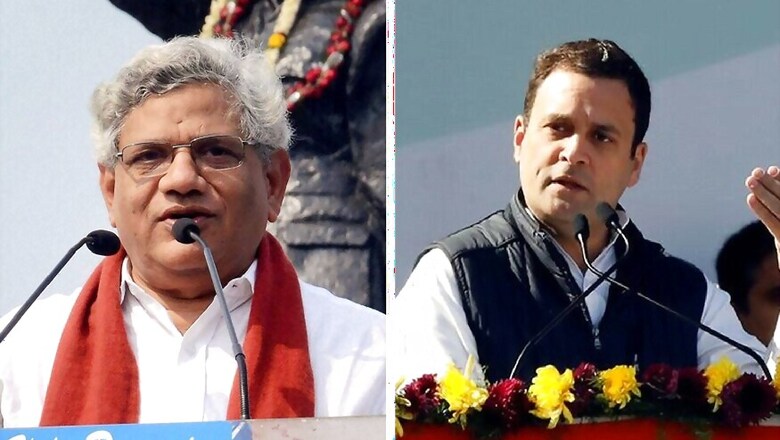
views
The outcome of the vote within the central committee meeting of the CPI(M), held in Kolkata on Sunday, is being subjected to various interpretations, some of which are grossly misleading.
The current General Secretary of the CPI(M) Sitaram Yechury, backed by the majority of its Bengal unit, has been advocating a pre-poll alliance with the Congress party on the basis of a commonly agreed programme, which can form the basis of a broader coalition against the ruling BJP. Only this, they argue, can ensure the Modi regime’s defeat in 2019 and ensure the revival of the CPI(M)-led Left front.
This is the line which has been defeated within CPI(M) central committee members, with 55 voting against it and 31 voting in favour.
Those complaining that the CPI(M)’s rejection will help the BJP are forgetting the 2004 experience. Despite programmatic differences and bitter electoral contests in its strongholds in 2004, the CPI(M)-led Left had extended outside support to the UPA government in order to keep the communal BJP out of power. Such a course of action has not been closed for the CPI(M) and other Left parties, if it is warranted by the post-poll situation in 2019.
However, a pre-poll alliance with the Congress will imply a jettisoning of the alternative policy platform advocated by the Left, since the Congress party remains firmly wedded to the neoliberal policy framework, which serves the interests of big corporates and international finance at the cost of the poor, working people.
On the issues plaguing the economy today – GST, Aadhaar linkage, bad loans crisis and the threat of bank privatisation – the Modi government is continuing with UPA regime policies. Despite Rahul Gandhi’s recent rhetoric, there has not been any indication that the Congress party is ready for a strategic rethink on these substantive issues. How can a pre-poll common programme be evolved with divergent approaches on economic and strategic matters?
The debate regarding a programmatic understanding with the Congress is not new within the CPI(M). Leaders like the late Saifuddin Chowdhury had parted company with the CPI(M) and formed a separate party in 2001, arguing for a strategic alliance with the Congress in the backdrop of the rise of BJP. Many of those who had opposed Chowdhury then, including the present General Secretary, are simply repeating his arguments now. Somnath Chatterjee, who had held similar views, could not continue in the CPI(M) either.
The ground realities in India do not favour a credible and durable CPI(M)-Congress alliance. The mass base of the CPI(M) is concentrated only in a few states. CPI(M)’s largest base now is in Kerala, where the Congress-led UDF is its principal electoral opposition. In Tripura, what used to be the erstwhile Congress party has now shifted entirely to the BJP (after a brief stint with the Trinamool Congress), and the CPI(M)-led Left Front can take it on in the forthcoming elections.
In other states, like Tamil Nadu, Andhra Pradesh and Telangana in the South or Himachal Pradesh and Rajasthan in the North, a CPI(M)-Congress tie-up will either be electorally inconsequential or would deliver one-sided benefits to the Congress, with the CPI(M) gaining nothing in return.
The West Bengal assembly election of 2016 is an apt example where the Congress finished second because of a tie-up with the CPI(M), the latter was relegated to third despite having a higher vote share. Since then, while five Congress MLAs, who were elected with CPI(M)’s support, have defected to the Trinamool Congress and the BJP has registered significant growth in Bengal, primarily by eating into the CPI(M)’s support base.
A CPI(M)-Congress tie up is not the answer to the Left Front’s erosion in Bengal, whose primary reason lie in its own rightward drift, which remains unrectified. Unless there is serious state-specific political-organisational course correction, there is zero possibility of any CPI(M) revival in Bengal.
(The author is a Left-wing economist. Views are personal)
















Comments
0 comment